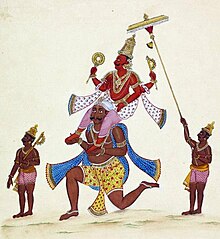Kubera

Kubera ( Sanskrit कुबेर kubera "the misshapen", Pali : Kuvera ) is the Vedic god of wealth, merchants, traders and the treasures of the earth. Forest spirits ( yakshas ) formed his retinue who watched over his treasures. Kubera is the half-brother of Ravana . He is married to the goddess Riddhi ("to flourish"). The god Vishvakarman is said to have built the golden city of Lanka as his residence in his honor , which was later robbed from him by Ravana. In Vedic times, Kubera is often seen as the embodiment of evil. In modern Hinduism it is only important as the 'sky guardian' ( Lokapala ) of the north. In today's Hinduism, his magnificent residence Alakapuri with the most beautiful garden in the world is in the Himalayas opposite that of Shiva . Kubera was having difficulty moving. The god Brahma therefore once gave him a winged vehicle called the Pushpaka , from which he threw jewelry on the earth to the poor. Kubera is considered a follower, admirer and close friend of Shiva.
Legends
A legend from the mythology of Ganesha tells of how the god was invited one day to the god of wealth in his palace. The voracious Ganesha, however, was so hungry that he ate all of Kubera's food, kept asking for refills and in the end made the god poor. In the end he even ate up all of Kubera's dishes and his palace and threatened to devour the god himself, since his immense hunger could not be satisfied. So Kubera complained in fear to Shiva, Ganesha's father, and asked him for help. Shiva then called Ganesha to him, admonished him and sent him to his mother Parvati , who gave him some rice flakes to eat. Thereupon Ganesha's cravings were tamed and Kubera was saved.
According to a later legend, Kubera lived as a thrifty ascetic for thousands of years , which is why he was elevated to the god of wealth by Brahma as a reward.
According to another legend, Kubera was a thief in a previous life. He had broken into one of Shiva's temples, the god of thieves. But the light in it went out and he brought it back with great determination. This impressed Shiva so much that he granted him the blessing of the status of an immortal god for his next life.
iconography
Medieval depictions of Kubera are rather rare; modern paintings, on the other hand, are all the more common. Kubera is usually depicted as fat and one-eyed. Its attributes are a primitive-looking club ( gada ), a pomegranate, a kettle or a money bag. His vahana is a ram, an elephant and sometimes a stooped brahmin . His body color is white. Kubera has only four teeth, three heads and seven legs.
literature
- Anneliese and Peter Keilhauer: The Imagery of Hinduism. The Indian world of gods and their symbolism. DuMont, Cologne 1983, p. 227, ISBN 3-7701-1347-0 .
- Gerhard J. Bellinger : Knaurs Lexikon der Mythologie, Munich 1999, p. 273, ISBN 3-8289-4154-0 .
Web links
Individual evidence
- ^ Jan Knappert, Lexikon der Indian Mythologie , Heyne Verlag Munich, 1994, ISBN 3-453-07817-9 , pages 179-180: Kubera / Kuvera
